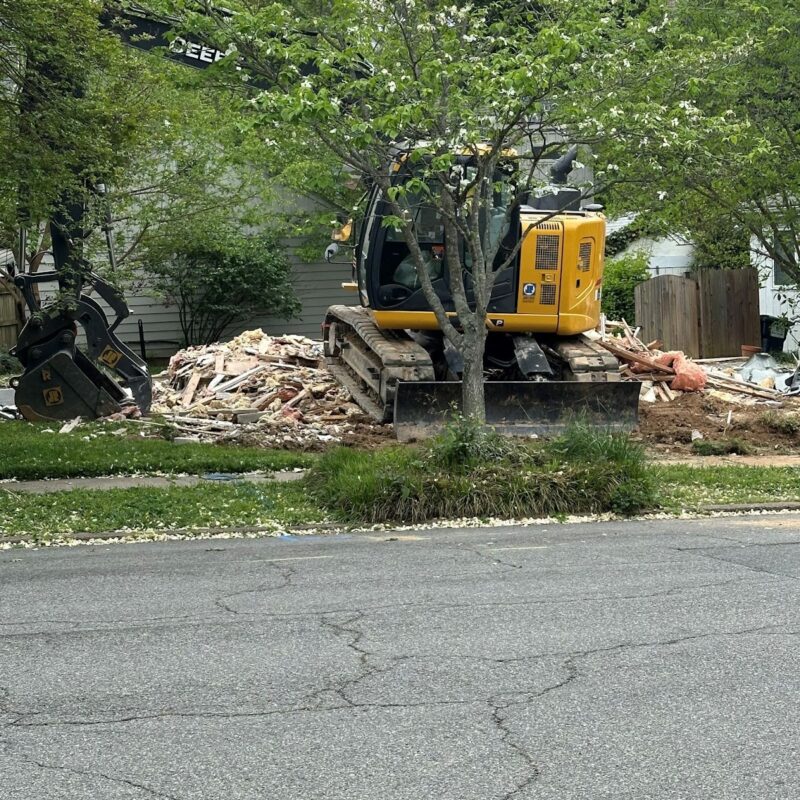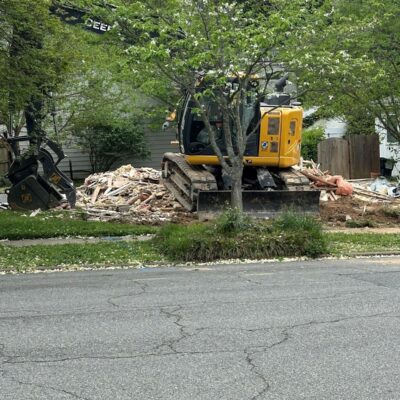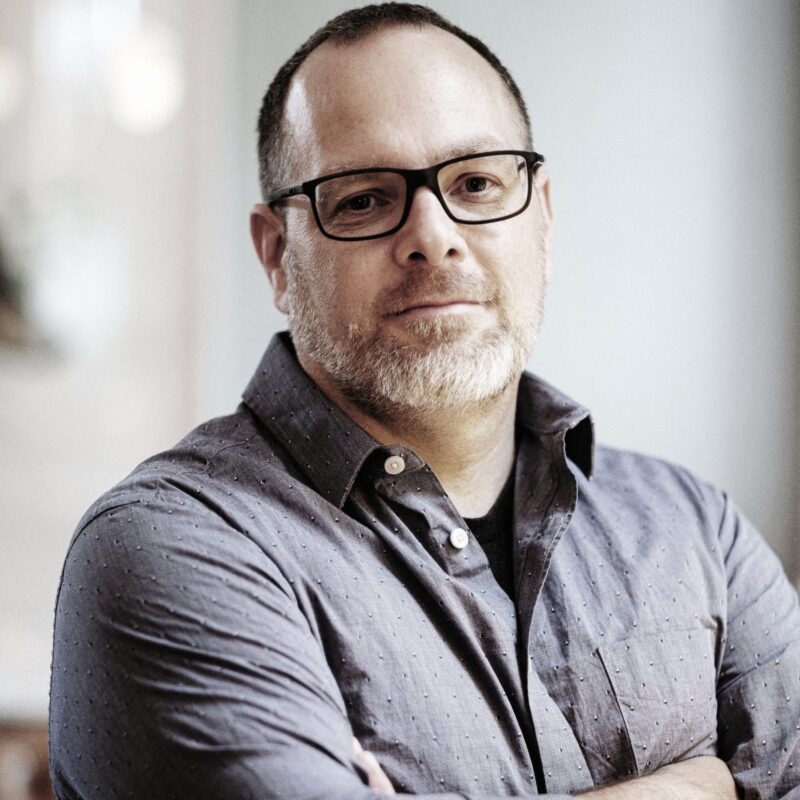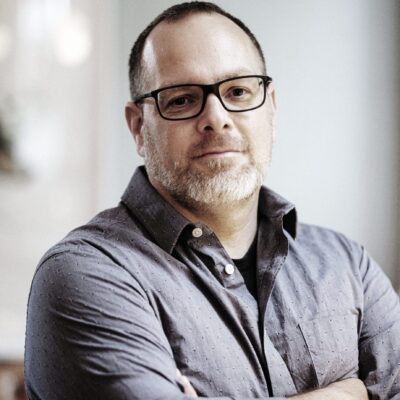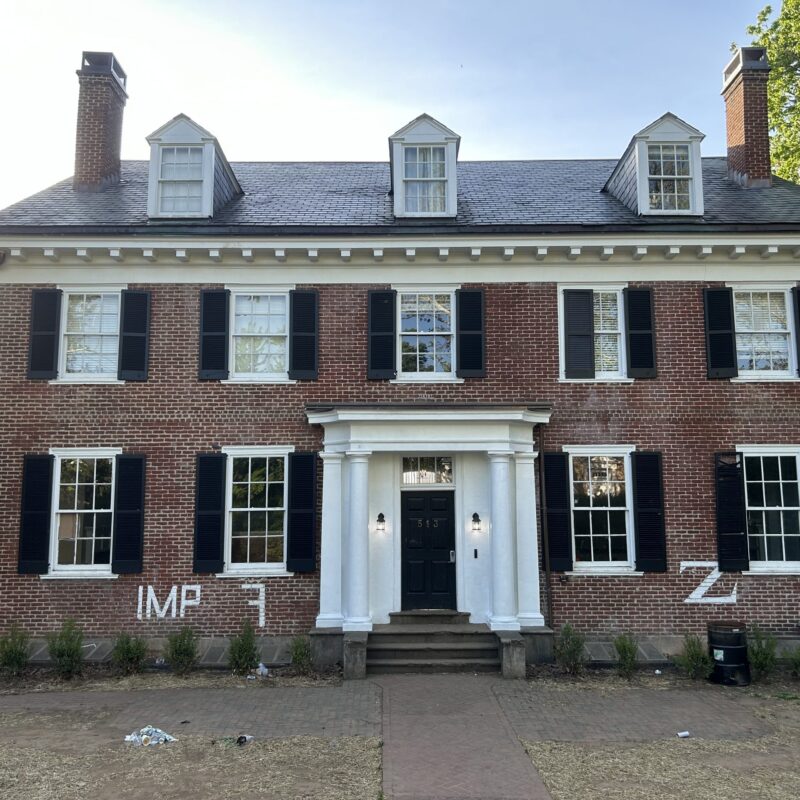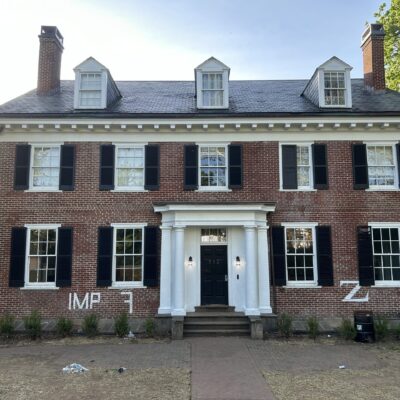The Girl Talk concert at Satellite Ballroom in September 2007 had all the makings of a Danny Shea-promoted event: an artist with more critical buzz than record sales; a total of 500 tickets that vanished before you could say, “Sold out;” a crowd that danced like a single, soaking wet mass. And the promoter himself, everywhere at once, doing everything but playing the music.
There he is, scanning the room—his concert space, “Shea’s stadium,” though he’d probably prefer “Wrigley Field”—the vacant room that he christened in 2004 and closed for good in 2008: Danny Shea in his office before the gig, checking guest lists. Shea in the crowd, grabbing an unsteady crowdsurfer and safely grounding him. Shea on the stage, his glasses safely removed as he toes the edge of the stage, his white Stax Records t-shirt soaked through with the sweat of the hundreds of audience members that rattle the floors, sweat that he earned from them and wears on his tall, slight frame.
“I remember him trying to keep everything plugged in while a bunch of kids were dancing around him,” says John Ruscher, a former Plan 9 employee and C-VILLE music columnist. “I think that’s very symbolic of what he was doing there—trying to hold everything together.”
In four years, Danny Shea single-handedly transformed the empty room behind Plan 9 Records’ Corner store into the city’s most exciting concert space, the biggest house party in town or, if not the biggest, the one with the best bands. Now, Shea has a new job—Starr Hill Presents’ newest booking agent—and the promise of a role in planning music for the biggest music game in town at the soon-to-be-unveiled Jefferson Theater.
|
“Starr Hill Presents is a brand that’s endured and grown over the years, and the Satellite Ballroom was kind of an up-and-comer,” says local booking agent and promoter Danny Shea, photographed inside Satellite Ballroom before the venue closed. “I’m bringing those strengths to Starr Hill, and hoping that I can expand the definition of what Starr Hill Presents means.” |
See, like most Danny Shea gigs, the Girl Talk concert was a first for Charlottesville, and like any musician’s first gig in a new city, it carried all the financial risk of an unpredictable act. Danny Shea’s concerts don’t scream big business or big bucks. He doesn’t bring the band that 10,000 people in Charlottesville want to see; instead, he brings the band that you want to see really badly, and sometimes he happens to be ahead of music trends. Each concert stamped with the Danny Shea Seal of Rock Approval comes with a thrill of the unknown and undiscovered, the possibility that a new band will come to town and completely enjoy itself, and that a new fan will do the same.
Now, the most anticipated venue in the city will be helmed by the most gifted booking agent in Charlottesville as well as live music’s biggest fan—a guy who dealt with his shows at the Satellite Ballroom on every level, from designing the gig posters weeks in advance to tearing them down the day after. A guy that, in four years, turned Plan 9’s adjacent room into a kind of musical Xanadu in which he crafted his own musical pleasure-dome; who carved his own niche largely independent of outside support and now, within the “largest independent promoter of live entertainment in Central Virginia,” is trying to figure out what, exactly, he needs to do next—neither a man apart, nor a part of The Man. Yet.
After all, Starr Hill Presents stands on the shoulders of giants in the live music industry, who have, up until now, towered above players like Shea. As an arm of Coran Capshaw’s Red Light Management company, Starr Hill Presents pairs with national ticketing and merchandise organizations like Live Nation to promote high-profile live music events at John Paul Jones Arena: your sold-out Bruce Springsteen gigs and greatest hits-heavy blowouts from The Police and Elton John, all time-tested and business-approved. It also works with other leading promoters to host massive music festivals like Bonnaroo. Shea is a kid with a bat stepping up to play ball for the first time, tentatively toeing the plate. Starr Hill Presents has the biggest bat in town and decides who plays ball.
In short, there’s independence, and then there’s independence. Can this musical tastemaker, now part of our city’s most visible and mainstream entertainment agency, continue to bring us the best, most interesting live music in the business? What does his new gig mean for Danny Shea’s independence?
Rock clubs and Chicago Cubs
Records and CDs can be heard, but a music scene like the one Shea created here has to be, well, seen—it needs a central icon, a rallying point.
Visually speaking, there was nothing particularly special about Satellite Ballroom—it was more of a giant walk-in closet that fit 500, a dark appendage of a room until Shea turned on the lights and started bringing in bands. Then again, there was never anything about Shea’s looks that set him apart from the fans he catered to when he started the venue; Shea’s music scene functioned like a tornado, with a whirlwind of fans dancing and moshing and cheering around an invisible center.
But, for a moment, let’s put Shea on stage and under the same lights. Shea’s our walking library of eclectic tastes, the iDanny, a music machine designed for all-purpose use in jeans, Nike sneakers and band t-shirts or, on cooler days, his Boris sweatshirt, purchased when the Japanese heavy metal trio performed at Satellite Ballroom. He’s tall and thin, in his 30s; the face around his eyes occasionally looks sleepy, the usual product of work and parenthood. (Shea and his wife, Angela, have a 4-year-old daughter.) But the eyes themselves, typically framed by black-rimmed glasses, move quickly, decisively. And then there’s the hat.
The greatest testament to Danny Shea’s music fandom isn’t what he wears on his sleeve, but what he wears on his head. When it’s not his Daptone Records hat—from the label that brought you Sharon Jones and the Dap Kings, a band that he brought to Charlottesville three times—Shea sports a baseball cap with the logo of the Chicago Cubs, a team that hasn’t won a World Series title in 100 years.
That same fandom informs every aspect of Shea’s work as a booking agent—not just the bands he brought to Charlottesville, but the commemorative posters and t-shirts he designed for local music functions, from Cat Power and Sharon Jones gigs to the annual WTJU Rock Marathon. A graduate of art programs at both Virginia Commonwealth and Syracuse universities, Shea’s resume lists design work for the likes of former local record label Jagjaguwar and bluegrass rockers Hackensaw Boys. In the corner of the same resume is a picture of a rabbit playing an electric guitar, the same design he created for the WTJU Marathon t-shirts in 2002.
In the commemorative posters—not the fliers, as he will specify later—Shea pairs an artist’s thematic consideration with a fan’s adulation. They’re beautiful, gig-specific tributes, each building on an intuitive connection to the subject’s sound: one for the oddly named dance rock act !!!, with each exclamation point refashioned as a spiraling, soft-serve ice cream cone; another for the futuristic rock heavyweight, Battles, featuring the eponymous figures from the “Rock ’Em Sock ’Em Robots” game.
Of course, a music scene based on visuals alone is fashion, and Starr Hill Presents didn’t hire Danny Shea to simply dress the part of a music geek. (Or, for that matter, a Cubs fan.) They hired him because Shea rode the bench as a record store manager and then suddenly started swinging away and cracking grand slams as an independent booking agent—he made a run for the pennant of the local music scene and turned the Satellite Ballroom into his own Wrigley Field of sorts, a spot where fans were occasionally few in number but always thrilled.
And, presumably, because Danny Shea knew something about music.
If you hit shuffle on our iDanny, this is what you’d turn up: the smoking soul of Sharon Jones and the Dap Kings, the approachable rock of the Pernice Brothers. But you’d also get hard rock and complexity—music that is catchy, but not necessarily on the first listen. An occasional song by Foghat or Def Leppard, the first bands Shea saw live when he was in middle school, and the Iron Maiden and Rush songs of his high school years.
“Rush was special to me, and still is,” Shea says to me during an interview. “I’ll defend them,” he adds, though I make no move to attack them.
The bands that Shea booked reflect the same broad interests—go-go from Washington, D.C., art rock from Berlin, post-punk from Scotland, and anything Charlottesville could offer to him as a listener. Shea booked acts so diverse, in fact, that you might think he acted entirely on impulse—his iDanny stuck on shuffle, swinging away at everything he could, constantly going to bat for the bands he adored as a fan.
|
Growth of the music empire |
Starr Hill Presents, which partnered with Satellite Ballroom in 2006, roughly a year before the Satellite Ballroom closed, opted to put Shea in a position where he could keep swinging in front of the same crowd, people that recognized his brand and his skill. When Satellite Ballroom’s lease ran out and CVS announced plans to move into the concert hall’s space, Starr Hill Presents’ first round draft pick among the Ballroom staff was Shea—a player with a lot of heart for the music game, to be schooled in the minor leagues of Starr Hill Presents, learn the ropes of the Charlottesville Pavilion and then move up to the majors and a starting position with the Jefferson Theater in 2009.
And, of course, to don a new uniform. For recent gigs by Kenny Rogers and My Morning jacket—gigs that he didn’t book—Shea suited up in the blue polo shirt of the Charlottesville Pavilion, almost the same rich blue color as the cursed Cubs’ uniforms. Which is enough to make any fan of Shea’s concerts wonder if he can recreate the success of his previous work. Or what that success might’ve meant in the first place.
Right now, Shea probably wonders the same thing. In fact, the only time that Shea seems a bit wistful, or particular, or defensive, is during our second interview, when I engage the fan and artist in him. I ask him about the new fliers—not his lavish monuments to the rock gods, but simple, largely black-and-white affairs, in front of the Jefferson Theater, in the spots reserved for the Starr Hill Presents gigs that he’s booked around town, and ask if he designed any.
Shea gets a bit hung up on the answer. “Yeah. I mean, yeah, I mean, they’re just utilitarian, it’s not really anything…yeah,” Shea finally concludes. “Not something I’m overly proud of, but yes. It’s just another role where, at the Ballroom, I was responsible for all of it.” He clarifies later, via e-mail, that “there is a big difference between concert posters and flyers [sic]. Both have a similar purpose. Flyers are more utilitarian, posters are more creative and open ended.”
“Proud and happy to have the opportunity to do both, but I take much more pride in the posters,” he writes in what seems like a telling moment, an artist separating a fan’s tribute from an employee’s obligation.
In large part, Shea still thinks like his own boss, which makes his current gig tricky. Of his new job, Shea says that his role is “a little ambiguous right now.” “I think once the wheels are turning on the Jefferson from a marketing [and] booking standpoint, my role becomes much clearer,” he adds.
He mentions Silver Jews, the ambling rock band fronted by former Charlottesville resident and indie rock’s poet laureate, David Berman, and lets it slip that he “had a date with them” for a gig in the city, the band’s first since a concert at—where else?—Satellite Ballroom in 2006. He emphasizes that the loss of the gig had more to do with not having a venue than moving from one organization to another.
“It would’ve been a couple weeks ago,” says Shea, “but we didn’t have a room for it. They definitely were trying to find creative ways with us…” And he sounds as regretful as the kid who forgot to pre-order his KISS tickets; Danny Shea the booking agent couldn’t do something for Danny Shea the fan. What happens if his fans feel the same way?
Win streak
“He got us tickets to see Prince at the Landmark theater for the ‘Diamonds and Pearls’ show—mindblowing experience,” says local booking agent Jeyon Falsini, who first met Shea as a student at VCU and credits him with taking him to see Parliament, Beck, and “some of the best shows I saw in the ’90s.”
“He’s always very much ahead of the curve, in terms of what’s going to be big on the national level,” Falsini adds.
|
Shea as tastemaker |
Being a fan can be isolating. I’ve had plenty of positive experiences at concerts booked by Danny Shea, even among painfully small crowds, but I’ve also wondered whether my desires to see the bands Shea brings to Charlottesville simply means that we both have impeccable—O.K., similar—tastes. So I ask high and low, from Shea’s oldest friends in the local music scene to his newest colleagues at Starr Hill Presents, for proof of Shea’s uncanny skill as a musical tastemaker. During which time I learn three things.
1. Danny Shea really loves music.
I get a few variations on this statement from different sources. Jamie Sisley, an employee of Red Light Management, calls Shea an all-around great guy and adds that “he cares a lot about music.”
“I think he’s a fan before he’s a promoter, and it shows,” adds Sisley.
Others say things about Shea being ahead of the game, but can’t explain how, exactly, he stays in touch with breaking bands. “He has a finger on the pulse of newer artists that probably haven’t hit my radar and may never hit my radar screen, just because of the difference in age and background,” says Kirby Hutto, general manager of the Charlottesville Pavilion. “We just think his real strength is in understanding who these new artists are, how to bring them into Charlottesville, and how to get the word out.”
On the other side of the fence from Shea’s colleagues are the friends and fans, people like Emily Sloan, a WTJU deejay and UVA graduate student. Sloan was a founder of the Citizens for Local Culture organization that launched a “Satellite Unite!” campaign to keep local music fans abreast of the Ballroom’s lease troubles before it closed; she also stumped for a venue on Preston Avenue that Starr Hill Presents proposed and ultimately withdrew.
“The general consensus I got was, ‘If Danny would be involved, we’d be happy with it, because we know what a good booking agent he is, and he cares most about doing what is right for the town musically,’” says Sloan. Regarding his role at the Jefferson, she adds, “Obviously his strength has been in a space the size of Satellite Ballroom,” a space with a capacity of 500 to the Jefferson’s proposed 700-750.
Hearing this answer from everyone I speak with concerns me, because it leaves entirely too much to chance. So he cares about music—who doesn’t? But, I’d be more concerned if it weren’t for the fact that…
2. Everyone has their own favorite Danny Shea concert.
This is slightly more reassuring. Across the board, people give specific answers, fans’ answers. Sisley names a gig by The Clientele and gushes that “no one brings those guys anywhere. When I found out they were coming to Charlottesville, that was a really big deal for me, and so I gave him a big congrats there.” Sloan recounts “being up front next to Danny, right next to the stage, seeing David Yow play.” Local musician Sarah White, who performed a half dozen times at Satellite Ballroom, casts her vote for Ron Sexsmith. Most mention the importance of Shea; few romanticize the Ballroom.
Falsini, who worked briefly for Starr Hill Presents, suggests that at one time Shea’s current employer made booking decisions based on Shea’s own work for the Satellite Ballroom. “It was when they started to see that Danny was having success with Satellite that they started to consider Nada Surf or Hot Hot Heat,” says Falsini. “I was working side by side with Jamie [Sisley] and I remember that we were distinctly saying, ‘We should take these shows they’re working over at Satellite.’” Sisley says on the record that he does not recall such a conversation.
|
Changing of the guard |
And Shea certainly doesn’t characterize his pre-employment relationship with Starr Hill Presents as a hostile one, though his employment with Starr Hill essentially meant the death of the “Satellite Ballroom Presents” name that Shea had developed as a booking alias. Even after the Ballroom closed, Shea kept booking acts he loved as “Satellite Ballroom Presents” for other, non-Starr Hill venues in town. But when his employers decided that this might make for some confusion, they rechristened Shea’s gigs as “Starr Hill Presents,” and Shea sent out a press release to announce the switch.
“We kicked around different ways of handling it,” he says after the fact. “To me, if we can put on shows and have the resources to do it, I’m happy to have them.
“It’s semantics, as far as I’m concerned.”
When I ask whether the music fan in him enjoys working gigs that he didn’t book, Shea responds, “I understand that I don’t have to love every band personally, and the shows aren’t really about me.” But then, a flash of the fan: “I feel like there are other opportunities where I can really put my stamp on [a concert] and brand it.”
And the Shea brand is distinguishable from a mile away—something that has always felt intuitive to me and that others confirm. As Cal Glattfelder, the owner of Sidetracks Music, says regarding a recent concert by Bonnie “Prince” Billy at Gravity Lounge, “I knew that was Danny immediately when I saw that name.”
No matter the team or the color of his shirt, Shea’s batting average seems to speak for itself. Which brings me to my third conclusion.
3. Everyone loves Sharon Jones.
Danny Shea’s finest hour, his coup de rock as an independent booking agent, was a trio of gigs by retro soul act Sharon Jones and the Dap Kings in 2005, 2006 and 2008; the final show sold out. This is the sort of phenomenon I’d hoped to identify—that Danny Shea brought Charlottesville a band on three separate occasions, nabbed the attention of an appreciative crowd that grew in size, and suggested an ability to leapfrog ahead of national trends. Sharon Jones and the Dap Kings last performed in Charlottesville to a capacity crowd of 500 at Satellite Ballroom. Roughly six months later, they performed in front of nearly 75,000 people as part of this year’s Lollapalooza music festival.
“She played here three times,” says Glattfelder, “and I saw all of ‘em! I mean, it was that good. I took somebody new every time.”
“He told me that this Sharon Jones girl was going to be a really big deal, and that I should check her out,” says Sisley. “I bought the CD on his recommendation, and I loved it, and it was a wonderful show. And she’s blown up.”
“I know that Starr Hill Presents would be very proud to put that show on, should Sharon Jones want to come back and perform in whatever venue Danny’s booking for,” says Falsini.
Even Shea marvels at his fortune. “There are definitely a lot of shows that I’m very happy or proud of, but they didn’t have the universal appeal of Sharon Jones,” he says. He designed the poster for Jones’ second gig in town—February 15, 2006, the day after Valentine’s Day—himself. In a send-up of the “I Love Lucy” title screen, he placed Jones’ face in the midst of a heart next to flowing script that read “I Love Sharon Jones.”
“I’d never heard of them ’til they played Satellite,” confesses Hutto. “I think there’s a whole lot of artists like that trying to percolate up in the new paradigm of the music industry. It takes somebody to take that risk booking them and bringing them into a new market and getting that exposure.”
But if Hutto wasn’t aware of Jones in his official capacity with Starr Hill Presents, wouldn’t it stand to reason that Shea might lose touch as well? That by joining the major leagues he might overlook the minors himself and pass right over the same acts he brought to such appreciative crowds?
Batter up
In the end, faith in Danny Shea requires being the sort of fan that takes chances on and roots for teams like the Cubs to win a pennant, or takes a chance on a city like Charlottesville. The crowd component can’t be removed from Shea’s success because, at his best, Danny Shea was the most enthusiastic member of a crowd that he created, as well as the biggest benefactor. At the same time, if Shea’s mystical talent is to flourish, he needs to continue to push against his employers, his music business contacts and, sometimes, what his biggest fans expect of him to get the job done.
Two anecdotes give me hope.
In the first, I call Sharon Jones, Shea’s great success story, his home run, to see if she remembers Charlottesville, the Satellite Ballroom, anything about Shea’s work. She’s remarkably easy to contact, particularly for a Tina Turner dynamo who filled to capacity roughly half of her club dates in early 2008. A musician at this precise place in her career—selling more albums to more fans at bigger shows—should be unreachable, always busy, inaccessible. And, well, Charlottesville should be inaccessible to her.
So, when I ask Jones what she remembers about performing in Charlottesville, she struggles for a moment, repeating the name of our city, drawing out the syllables: “Chaaar-lottesville, Vir-giii-nia.” I tell her that the club she played was called the Satellite Ballroom. That seems to do the trick.
“The Satellite! The Satellite was cool, I remember the Satellite!” exclaims Jones with a laugh. “You know what? After a while, they all start to blend in.”
Then, unprompted: “The Satellite had the little upstairs place, and…what’s his name, what’s his name? Danny?”
Eureeka! A horn section straight out of Soulsville, U.S.A sounds in my head.
“I remember he went through a lot. He took a chance on us coming in that club—people hadn’t heard of us,” says Jones. “I know we sold out, but I’m quite sure he had to put out a lot to even get us there. How is everything? Still going great with him?”
In the second anecdote, I stop by Gravity Lounge to see local indie-folk act Birdlips and a San Francisco-based rock group called Birdmonster—a show that Shea booked as a Satellite Ballroom Presents gig, since rechristened as Starr Hill Presents as part of the merger.
It’s October 2, the day after my last interview with Shea and the night of the vice presidential debate, and fewer than 20 people are on-hand to see Birdmonster’s first gig in Charlottesville. It’s also the night of the second game between the Los Angeles Dodgers and the Chicago Cubs, and Shea is watching his laptop for live updates on the game when I arrive.
After Birdlips’ set, I head for the door where Shea is still sitting, ready to send more people inside. His laptop is still on, but if things are going great for him, they don’t look good for the Cubs. (Ultimately, they will lose the game 10-3, and their postseason run will end the following game. The curse continues.) He asks if I’m leaving before the headlining act, Birdmonster, takes the stage, and I say yes.
“Go back,” he says. “Ten minutes. Two songs.” And for a few reasons—my own history of memorable Shea concerts, words from a musical sage that has rarely steered me wrong—I go back inside, stay for four songs and completely enjoy myself.
Part of me feels like Starr Hill Presents partnered with a sinking Satellite Ballroom for the purpose of nabbing Shea—that it invested in a venue with a landlord who would not renew its lease, snatched up a music-savvy dude with an unfathomable knack for picking the right bands, a lanky Clive Davis-type, and simply stamped its brand name over his. And part of me feels that maybe Shea infiltrated the system, that no matter his uniform, he’ll bring the bands that I and everyone else wants to see to our town. But I can’t prove either because, well, there’s independence, and there’s independence.
“The fan is the one who suffers,” said Frank Robinson, a man who cracked over 500 home runs and won two World Series titles. “He cheers a guy to a .350 season, then watches that player sign with another team. When you destroy fan loyalties, you destroy everything.”
The single thing that elevated Danny Shea to his job as our musical curator, and the single thing that can preserve his independence, is fandom—both his adoration of the bands he works with and the dedication of those in the city who recognize his mark, even if the name has changed and Shea’s swinging away for another team. If you really want to rock ’n’ roll, sometimes you need to play ball. Fortunately for us, a season with Shea at bat should be an interesting one.




